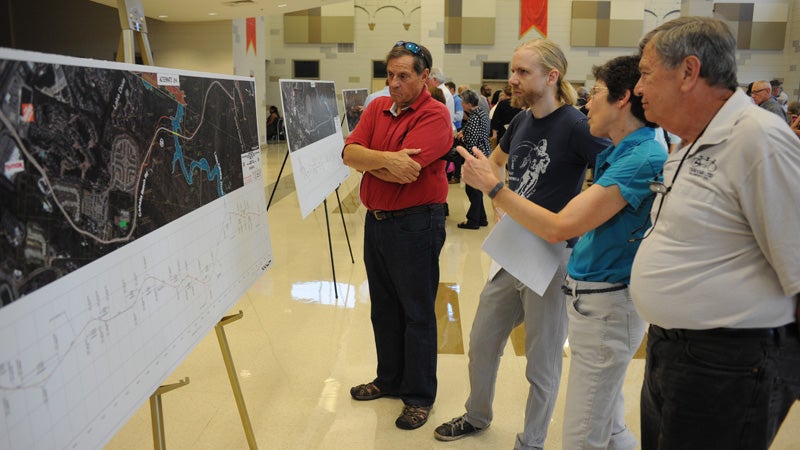County responds to Birmingham’s opposition to Cahaba Beach Road project
Published 2:37 pm Thursday, November 29, 2018

- Local residents study proposed alternates for the extension of Cahaba Beach Road during a public input meeting in August at Liberty Park Middle School in Vestavia Hills. (FILE)
COLUMBIANA – A Shelby County official called the Birmingham City Council’s recent opposition of the extension of Cahaba Beach Road a “setback to intergovernmental cooperation.”
Shelby County Engineer Randy Cole, speaking at the Shelby County Commission meeting on Monday, Nov. 26, expressed disappointment that Birmingham would oppose the project based on environmental concerns before studies are concluded.
“The City Council has objected to the project without knowing the final route and what protective measures might be used to protect the (Little Cahaba River),” Cole said. “This seems disingenuous at best.”
Cole also said that the measure, which was approved unanimously Nov. 20, could cause Shelby County to reconsider funding toward a Birmingham project.
“Birmingham is preparing to begin an engineering study to realign Grants Mill Road, and any proposed route would be within the Lake Purdy drainage basin,” Cole said about the body from which Birmingham draws drinking water, and which is fed by the Cahaba River. “Birmingham asked Shelby County and other local governments to help fund the study with a $60,000 contribution. Shelby County was planning to participate before the City Council resolution dealt a setback to intergovernmental cooperation.”
In its resolution, the Birmingham City Council expressed concerns about risks to water quality, including the potential for a hazardous spill into the drinking water source, pollution from the road and loss of natural forests that help keep the water clean.
The project would connect U.S. 280 in Shelby County to Sicard Hollow Road near the Liberty Park development.
A third public involvement meeting about the project was held in August at Liberty Park Middle School in Vestavia Hills.
Supporters said the project would alleviate traffic on U.S. 280 and provide another route to the busy corridor for Liberty Park residents, but others maintain the road could harm the environment.
Though the five options presented to the public at the last meeting—four potential routes and “no build”—remain on the table, Alabama Department of Transportation East Central Region Engineer DeJarvis Leonard said at the time that “advanced studies” from that point would focus on “full-control access” models.
Advanced studies include environmental impact, Leonard said, and full-control access means development would not be allowed along the corridor.
The full-control access approach is based on feedback from previous public meetings, Leonard said.
But many of those at the meeting remained opposed to the project. Several attendees wore shirts declaring “Save Greater Birmingham’s Drinking Water.”
Shelby County has partnered with Alabama Department of Transportation for engineering and environmental studies related to the project.
“The project was conceived to reestablish connectivity and replace a route that was in use for over 80 years until the bridge over the Little Cahaba River was closed because the city of Birmingham was unable to keep large trucks off of it,” Cole said. “The route will directly serve residents of unincorporated Shelby and Jefferson counties, as well as residents of the cities of Birmingham, Hoover, Vestavia Hills, Mountain Brook, Irondale, Leeds and others in the area.
“The environmental studies that are being done along potential routes meet or exceed the standards required by the Federal Highway Administration in order to build the road the federal money.”









